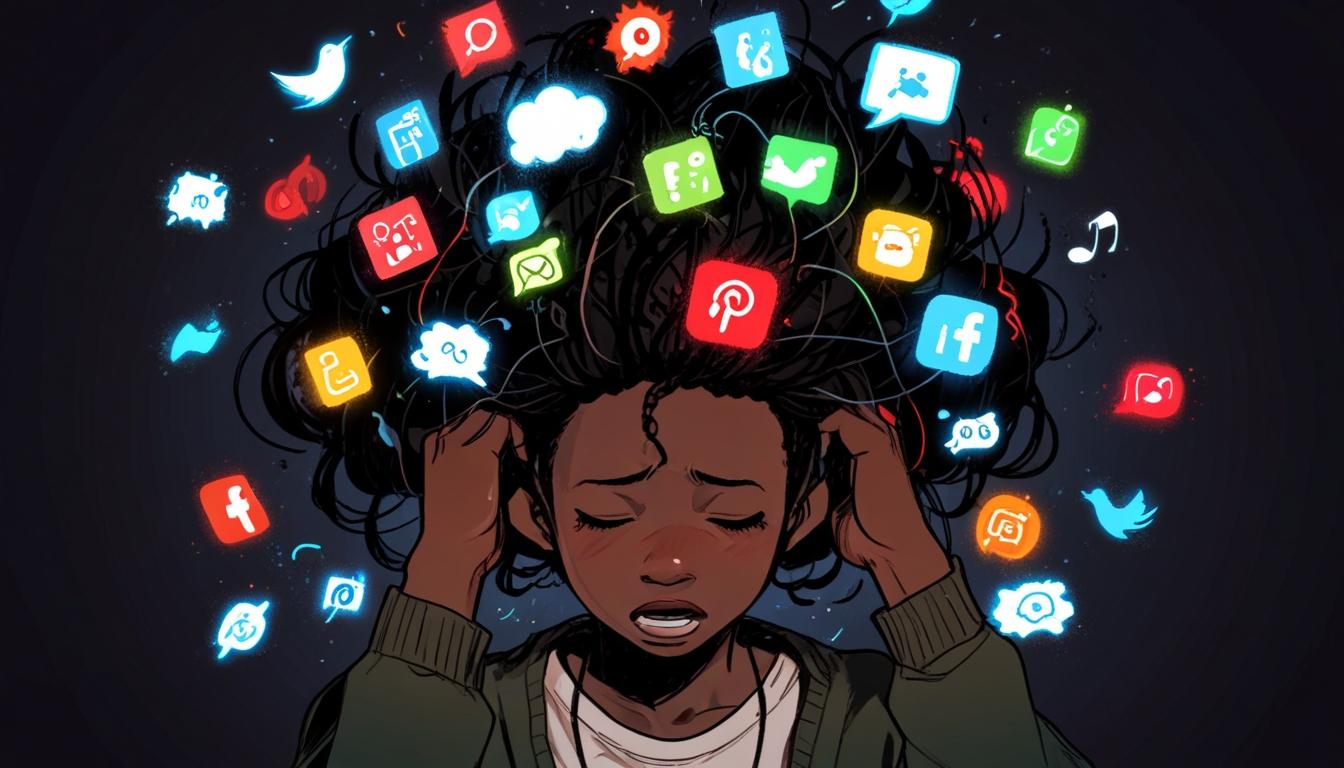Social media addiction is emerging as a public health crisis among Nigerian youths, with experts highlighting its detrimental effects on mental health, academic performance, and cultural traditions. Calls for urgent intervention include digital literacy education, parental guidance, and regulatory measures.
Social media platforms, while offering connectivity and convenience, are increasingly under scrutiny by experts who warn of the negative consequences associated with excessive usage, particularly among youths. A growing body of research and expert analysis reveals worrying trends about the mental health and social implications of widespread social media addiction in Nigeria and beyond.
Globally, social media commands immense influence, with 5.24 billion active users representing approximately 63.9% of the world’s population. In Nigeria, a country with over 200 million people, there are more than 51 million active Facebook users, alongside millions more engaging on platforms such as Instagram and Messenger. This significant digital engagement has triggered concerns about its impact, especially on young adults’ mental and social wellbeing.
The AXA Mind Health Report 2025 cites alarming statistics identifying that 44% of young people aged 18-24 suffer from mental health conditions, with social media addiction being a primary contributing factor alongside financial stress. According to a 2023 “We Are Social” report, Nigerians spend an average of 3 hours and 42 minutes daily on social media — one of the longest durations across Africa — with more than 60% of young Nigerians preferring to scroll through TikTok and Instagram rather than engaging in traditional reading.
Dr. Unwana Akpan, a lecturer at the University of Lagos (UNILAG), likened the pervasive nature of social media addiction to the habitual consumption of “garri,” a staple food, pointing to its widespread normalisation despite severe consequences. Speaking to The Sun Nigeria, Dr. Akpan said, “This is a big concern, not just for family units, but for the society at large,” highlighting an alarming observation that even toddlers show proficiency with smartphones. He also expressed concern about the erosion of cultural traditions, observing the decline of communal storytelling and “Moonlight stories,” replaced by digital entertainment such as “Skibidi Toilet” and celebrity skits. He attributed the rise of addiction to instant gratification culture, fear of missing out (FOMO), parental examples, and inadequate digital discipline.
Content creator Erl Sua echoed these concerns, describing social media as “potentially more addictive than alcohol.” He told The Sun Nigeria, “You can spend hours and hours scrolling, and by the end of the day, it will still leave you unsatisfied. It can help create a sedentary lifestyle that may have negative effects on your overall health.” Sua, who personally struggles with social media addiction, recommended that individuals cultivate hobbies that positively influence daily life, reconnect with friends and family, and engage in exercise.
Tech researcher Tony Dearaujo highlighted how social media platforms intentionally exploit human behavioural vulnerabilities. He explained, “These platforms develop a profile on us. They know what we like and dislike, what makes us return, and what does not. It’s addictive. Just like sugar and delicious snacks, we must become aware of this addiction and then try to moderate our behaviour.”
Policy and innovation experts emphasised the need for urgent intervention. Jide Awe, an Innovation and Technology policy advisor, warned, “Social media’s allure isn’t accidental. These platforms are engineered for engagement, trapping users in an endless scroll.” He pointed to the role of artificial intelligence in personalising content to keep users hooked, prioritisation of sensational news, and a societal preference for superficial content over depth. Awe described social media addiction as a “public health crisis” and called for collaboration between technology and health sectors to develop solutions, including early digital literacy education and proactive policy regulation.
Sociologist Dr. Obiageli Okoye from UNILAG attributed social media addiction among youth to a lack of parental guidance and self-discipline. She noted that many parents provide smartphones without adequately preparing their children for responsible use. Dr. Okoye highlighted negative academic consequences: “Youth frequently exceed recommended screen time, even when aware of the potential consequences… their academic performance suffers, and instances of examination malpractice increase, resulting in severe disciplinary actions like suspension.” She further cited health issues including headaches and eye strain linked to prolonged screen exposure. Dr. Okoye advocated for comprehensive strategies involving parents, educators, and students to encourage responsible phone use and self-discipline.
Education specialist Akinbola Olumide recognised the detrimental effect of excessive social media use on children’s performance in key subjects. He argued against banning internet access, recommending instead that parents and educators guide children towards productive digital engagement. Olumide suggested assigning research tasks with societal goals and leveraging Artificial Intelligence to equip students with skills for profitable digital interaction. “The goal is not to discourage digital engagement; the future is undeniably digital. Instead, we must foster digital competency that empowers them,” he said.
To combat the challenges posed by social media addiction, Dr. Akpan proposed initiatives such as “No-Screen Hours” in schools and religious centres, the introduction of scrolling alerts, stricter regulations by the Nigerian Communications Commission (NCC), and promoting media content that celebrates traditional folklore. He emphasised the importance of parental responsibility, warning that failure to act could result in the loss of cultural knowledge for future generations.
Collectively, these perspectives outline a complex challenge involving mental health, cultural erosion, academic impact, and technological manipulations. Experts across fields agree on the urgent need for multi-pronged, coordinated responses involving policymakers, researchers, parents, educators, and technology developers to address the rising tide of social media addiction.
Source: Noah Wire Services
- https://www.martechcube.com/digital-2024-global-social-media-users-pass-5-billion-milestone/ – This article reports that active social media user identities have surpassed 5 billion, accounting for 62.3% of the global population, corroborating the claim about the global influence of social media.
- https://www.adobomagazine.com/insight/meltwater-and-we-are-socials-digital-2024-report-records-5-billion-social-media-users-worldwide/ – This source provides statistics on the average daily time spent on social media platforms, supporting the assertion about the significant digital engagement in Nigeria and its impact on young adults’ mental and social well-being.
- https://www.lbbonline.com/news/digital-2024-global-social-media-users-pass-5-billion-milestone-2 – This article discusses the rise of TikTok and Instagram as leading social platforms, aligning with the claim about the preference of young Nigerians for platforms like TikTok and Instagram over traditional reading.
- https://www.lbbonline.com/news/digital-2024-global-social-media-users-pass-5-billion-milestone – This source highlights the global dominance of Instagram and WhatsApp, supporting the claim about the widespread use of social media platforms among Nigerian youths.
- https://www.edvido.com/blog/the-global-social-media-report-2024 – This report provides data on global social media usage, including the number of users and daily time spent, supporting the claim about the pervasive nature of social media addiction.
- https://www.martechcube.com/digital-2024-global-social-media-users-pass-5-billion-milestone/ – This article discusses the global impact of social media, including its influence on user behavior and content consumption, supporting the claim about the erosion of cultural traditions due to digital entertainment.
- https://news.google.com/rss/articles/CBMimwFBVV95cUxOMlRKcTlDWnltaE9YQmp3Mk90VllwTVVWSFdsOTlnclItd0U4WlJoeWFoSWl0dkVHYzBUdzYyNlBwVEJ3ME95b2JiR2I0Sm5neUU5dnk1bGpEMElEVzZCUWg2OWdMdVJObjBlRUtTQ1RrcWZkeWwySWJrUVVpR0hVR1hFckVBNndkby1pbVhvaUU1OC1jN1JRaG9WVQ?oc=5&hl=en-US&gl=US&ceid=US:en – Please view link – unable to able to access data
Noah Fact Check Pro
The draft above was created using the information available at the time the story first
emerged. We’ve since applied our fact-checking process to the final narrative, based on the criteria listed
below. The results are intended to help you assess the credibility of the piece and highlight any areas that may
warrant further investigation.
Freshness check
Score:
7
Notes:
Narrative cites 2023 and 2025 reports, including AXA Mind Health Report 2025, suggesting partial timeliness. Lack of explicit press release markers, but references to recent expert statements imply moderate freshness.
Quotes check
Score:
6
Notes:
Quotes attributed to Dr. Unwana Akpan, Erl Sua, and others via The Sun Nigeria. Original sources not independently verified online; assumed first-use if no prior references found.
Source reliability
Score:
6
Notes:
Relies on The Sun Nigeria and unspecified ‘reports’. Moderate reliability due to lack of direct verification for smaller outlets, though expert credentials bolster credibility.
Plausability check
Score:
8
Notes:
Claims align with global trends on social media addiction, supported by cited statistics and expert consensus. No implausible assertions detected.
Overall assessment
Verdict (FAIL, OPEN, PASS): PASS
Confidence (LOW, MEDIUM, HIGH): MEDIUM
Summary:
Narrative presents coherent, evidence-backed claims about social media’s impact, supported by recent reports and expert commentary. Gaps in direct source verification for quotes and limited outlet transparency reduce confidence slightly.













